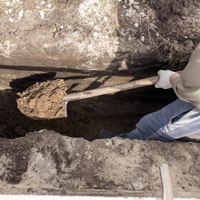Trench Deaths on the Rise
February 8, 2019 Recent data shows the construction market is rebounding. While this is a good sign for the economy, a construction boom may be associated with lapses in safety, such as trench accidents. Likewise, a shortage of skilled labor has resulted in an uptick of serious injuries and fatalities related to trench collapses. The Bureau of Labor Statistics, which compiles nationwide data on workplace injuries and fatalities, notes that for the past two years single-family residential construction sites in places like Jacksonville, Florida experienced an all-time high of deaths from trench collapses. Further, the combined number of deaths and injuries from trenching activities in 2017 made it the most dangerous year for trench safety in recent history.
Recent data shows the construction market is rebounding. While this is a good sign for the economy, a construction boom may be associated with lapses in safety, such as trench accidents. Likewise, a shortage of skilled labor has resulted in an uptick of serious injuries and fatalities related to trench collapses. The Bureau of Labor Statistics, which compiles nationwide data on workplace injuries and fatalities, notes that for the past two years single-family residential construction sites in places like Jacksonville, Florida experienced an all-time high of deaths from trench collapses. Further, the combined number of deaths and injuries from trenching activities in 2017 made it the most dangerous year for trench safety in recent history.
The Occupational Safety and Health Administration (OSHA) has initiated a National Emphasis Program to deal with the problem. Heightened enforcement activities and greater efforts to provide trench safety training are underway. The agency offers free on-site consultation separate from enforcement actions. These free consultations are a proactive approach to protecting worker safety and do not result in penalties or citations.
Trenching activities include digging operations of deep channels. These most often involve placement of plumbing work such as sewer and water lines. They also include installing utilities such as telephone and cable lines. Danger from trenches varies with the depth of the trench and the condition of the soil. Conditions such as rain or vibration can also worsen the danger of a collapse.
Legal Requirements for Trenching Activities
OSHA has specific standards for trenching activities. The agency requires an employer to act to prevent trenches from collapsing on workers. The requirements apply to all trenches that are greater than five feet deep unless the trench is made entirely in stable rock. Requirements differ depending on how prone the soil is to collapse.
Design and placement of protective systems require specialized training and experience to perform correctly. A knowledgeable and trained individual must verify the protective system is safe before allowing workers to enter the trench. The following describes the protective systems that can be used.
- Slope or bench trench walls. Sloping involves cutting back the trench wall at an angle inclined away from the trench. Benching involves excavating the sides of the trench to form horizontal steps. Benching cannot be used for “type C” soil.
- Shore up trench walls with supports. Shoring involves installing aluminum hydraulic or other types of supports to prevent soil movement and cave-ins.
- Shield trench walls. Shielding involves using metal sidewalls held apart by spreader rods.
Liability for Trenching Accidents
Builders and general contractors have a responsibility to provide workplaces free of recognized hazards to all workers on their worksites. This includes subcontractors such as plumbers. In a recent case, a residential construction firm was charged with felony manslaughter of a worker who died while working in a seven-foot deep trench. The trench was not properly shored up and collapsed on the worker. OSHA also inspected the site of the fatality and issued civil fines for violations of its standards for trenching activities. Civil fines can be substantial depending on the seriousness of the violation. If the failure of the employer was willful or egregious, significant fines may be levied. OSHA has issued fines as high as $294,000 for a recent trench collapse.
Philadelphia Construction Accident Lawyers at Galfand Berger LLP Represent Workers Injured in a Trench Collapse
If you have been injured in a trench collapse or other construction accident, contact an experienced Philadelphia construction accident lawyer at Galfand Berger LLP. We have offices statewide and represent clients throughout Pennsylvania and New Jersey. Call 800-222-USWA (8792) or complete our online contact form to schedule a free consultation.
 Google Screened
Google Screened
